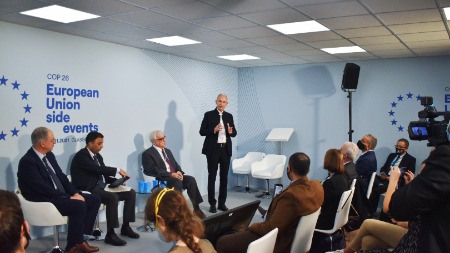Opinion - February 15, 2019
Can growth save our planet ?


Written by Bertrand Piccard 4 min read
In 1901, Henry Dunant was awarded the first Nobel Peace Prize for the establishment of the International Committee of the Red Cross and the adoption of the Geneva Convention. Yet, this Swiss pioneer of humanitarian right faced fierce opposition from the pacifist movement. They believed that creating an organization destined to offer relief and aid to the wounded on the battlefield, actually authorized and endorsed the principle of war itself, instead of condoning it. The underlying debate here was the opposition between pragmatism - wars exist and most likely always will, so let’s work on mitigating its consequences - and utopia - war is bad, so let’s prevent it from happening ever again.
Are Ecologists the new Pacifists?
Pacifists have always wanted to get rid of war. The same way ecologists are trying to eliminate growth, advocating for economic decline and arguing that it is the only possible way for our civilization to live in harmony with the environment. Are we facing a new utopia? Believe me, I am well aware of the harm that unlimited growth - as we’ve had it for the past century - has done to our Planet. But I believe growth is unstoppable as much as war is inevitable. Why that? And here I speak more as a psychiatrist than an explorer: because it is in the human nature to want always more and better, not less. Promoting restrictions in mobility, comfort and freedom has created more resistance than support to the environmental cause. Saying that we must stop growing and halt progress is a denial of the very essence of man. It is a wishful thinking, just as stopping war was the wishful thinking of the Pacifists. I believe we need more than this to fight against climate change.
What we need now is pragmatism. I have long been inspired by Henry Dunant’s pragmatic vision and I believe such an approach can be transposed to the climate crisis. If growth as we know it today threatens our very chances of thriving on this Planet, even though it is inevitable, what is left for us to do? We must find a new path to develop our economies while at the same time preserving nature. You think that’s impossible? Think again!
The third way
Between self-destructive growth and going back to the Middle age, a third way exists: clean economic growth, which would offer us prosperity, but in a sustainable manner. This new type of economic development is based on qualitative growth rather than quantitative growth. Instead of considering our wellness on the increasing quantity of goods and services we consume, we can make much more profit by taking the massive opportunity of replacing old inefficient and polluting systems and infrastructures by efficient and clean ones. Qualitative growth is based on producing better, rather than consuming more. Not only will this state of mind create millions of jobs, opportunities and markets, it will also create much more wealth! Imagine the profit for everyone that will come from developing electric mobility, insulating all the buildings to make them carbon neutral, replacing the outdated lighting, heating and cooling systems by LEDs and heat pumps, introducing more efficient industrial processes, building smart grids allowing countries to halve their energy needs, shifting to renewable energy sources that are now cheaper than fossil fuels. Technology offers today more solutions for the environment than restrictions and sacrifices made by the populations. And this is also true for the poorest countries who are desperate to catch up with our standard of living. To put it very simply: clean growth is much better than the dirty status quo. It is not only achievable and necessary, it is the biggest economic opportunity since the industrial revolution. This is a language that will be heard by the world of politics and finance, and will also serve the noble goal of the Environmentalists, if only we all become logical as much as ecological...
If we can’t stop war, the least we can do is try to make it bearable for the wounded. So if we can’t stop growth, let’s make it sustainable for our environment! This pragmatic approach, I believe, is the only way our civilization can survive the biggest threat of our time: climate change, pollution and depletion of natural resources.
This article has been previously published on Bertrand Piccard's Linkedin page.

Written by Bertrand Piccard on February 15, 2019


